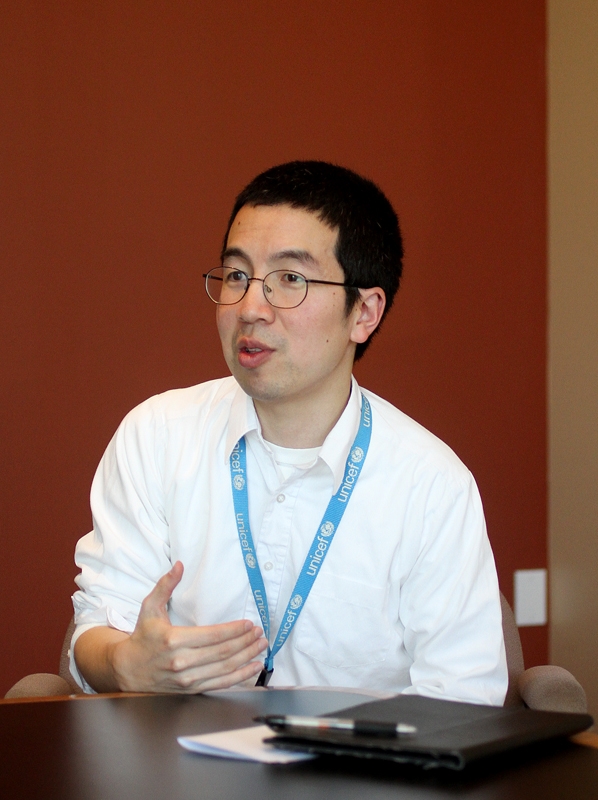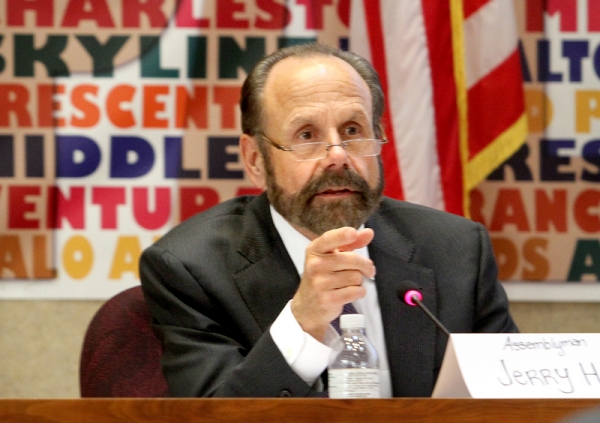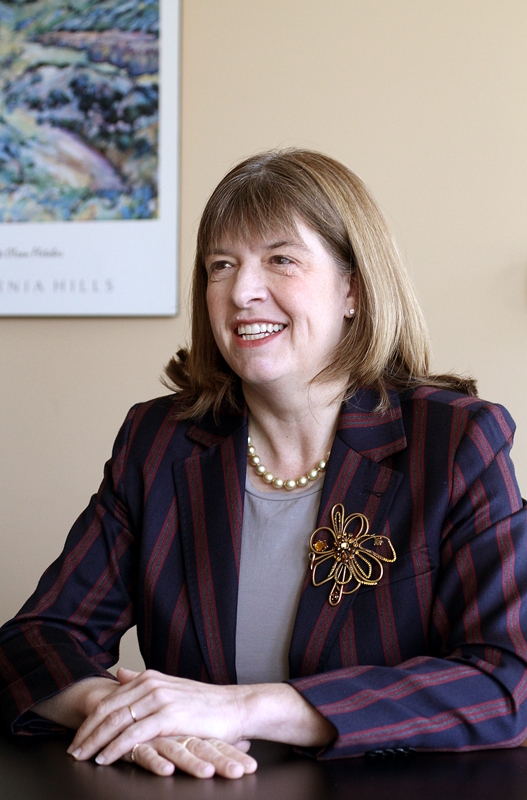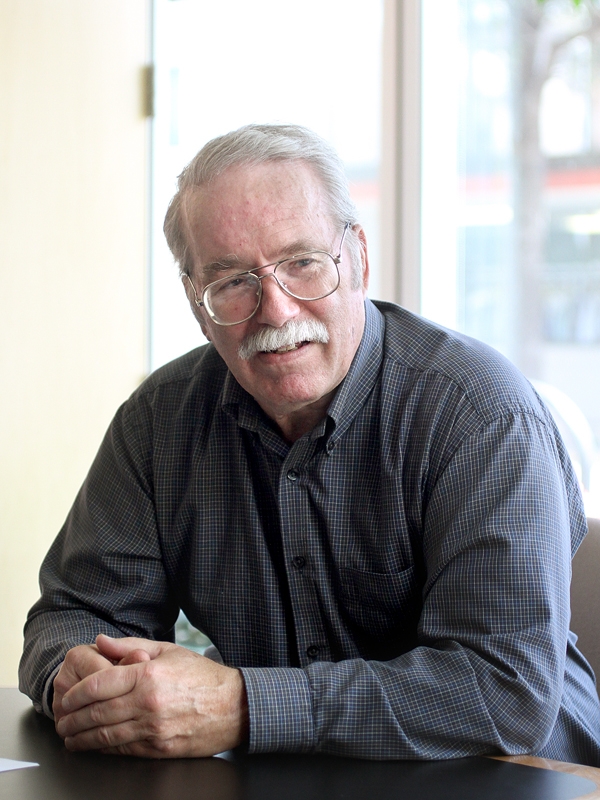To the average Peninsula voter, Brisbane and Sunnyvale have little in common. The former is a small, industrial suburb on San Francisco's doorstep, the latter a high-tech hub in the heart of Silicon Valley.
But to state Assemblyman Jerry Hill, the two municipalities are facing many of the same issues, including concerns over Caltrain's survival, open-space preservation, high-tech jobs and airport noise. Hill, a two-term Assemblyman whose 19th District includes most of San Mateo County (including Brisbane), this June finds himself in a four-way race to replace state Sen. Joe Simitian, D-Palo Alto, in the newly redrawn District 13. If he were to win, his constituency would encapsulate much of his existing district in San Mateo County and the northern part of Santa Clara County, including Palo Alto and Mountain View.
Hill's most formidable opponent, Mountain View's former three-term state Assemblywoman Sally Lieber, is approaching the race from the other side, both geographically and politically. While Hill touts his ability to find the middle ground and get along with a wide spectrum of constituents (his website includes list of roughly 400 endorsements), Lieber embraces her image as a firebrand who fights for the needy and the disenfranchised.
"I've never been the favored candidate of the powers that be," she proudly proclaimed at a recent interview.
Also on the ballot are Christopher Chiang, a reform-minded schoolteacher from Mountain View, and John Webster, a libertarian crusading against what he calls the "darker side of democracy." Each is running on a shoestring budget of about $1,000 and is concerned as much with shifting the conversation as winning the race.
The district they seek to represent looks nothing like the one Simitian took over eight years ago, when he replaced another Palo Altan, Byron Sher, in the Senate. The prior district -- a rabbit-shaped blob with jagged contours that hint at decades of politically driven chiseling -- was overhauled last year. The nonpartisan California Citizens Redistricting Commission took a rolling pin to District 11 and smoothed it into a parallelogram stretching from Brisbane to Sunnyvale. The new District 13 occupies much of Simitian's old District 11, including Palo Alto, Menlo Park and Atherton. Now, these cities will be sharing representation with most of San Mateo County and the cities of Mountain View and Sunnyvale.
The district's changing borders and increasing girth shifts power away from Palo Alto. All four candidates live outside the old District 11 boundaries and would have been ineligible to run for Simitian's seat. Hill was born in San Francisco and learned the political ropes in San Mateo, where he followed the traditional trajectory from community leader to councilman to Assemblyman. His three opponents are all from Mountain View, a city that until now has been represented by Democrat Elaine Alquist. With San Mateo County claiming the lion's share of the new District 13, each is at a geographical disadvantage against Hill, though Lieber claims she has name recognition throughout the district.
When the election dust settles, Palo Alto residents will not have a homegrown representative in their Senate district for the first time in 16 years.
Both Hill and Lieber are Democrats with strong environmentalist credentials, but they also have profound differences. Hill's record includes bills supporting green technology, strengthening consumer protection and beefing up regulation for utilities. Lieber has focused on social services and protection for the disenfranchised, whether they be pregnant convicts or people who are homeless. If elected, Lieber said she would seek as one of her first legislative proposals a bill that would increase the amount of food allotted to pregnant state prisoners.
Though Hill emphasizes his roots as a community leader and a small-business owner, in this race he is in many ways the establishment's choice. His endorsement list includes a raft of mayors and council members (including seven of nine Palo Alto council members), the Association of California State Supervisors, the San Jose Silicon Valley Chamber of Commerce and the California Labor Federation. He has also received contributions from an array of pharmaceutical, biotech and health care companies, including Genentech, Eli Lilly and the California Association of Health Facilities. While Lieber said she would never seek an endorsement from pharmaceutical lobbyists, Hill asserts that his long list of supporters is proof of his ability to find the middle ground.
He also rejects any implication that money could sway his votes. The prime example for him is PG&E, which in the past contributed to his campaign. That hasn't kept Hill from becoming one of the company's toughest critics in the Legislature.
Hill toured the San Bruno neighborhood devastated by the gas explosion on the morning after and was deeply moved by what he saw. His legislative priorities immediately changed, he said.
"Cars that were blocks away were melted," Hill said. "To see the destruction and the smoke that was still coming from homes and the eight lives that were lost -- it personalized it for me."
Since the explosion, Hill has consistently criticized PG&E for its "complacent culture." His recent bills include one that requires PG&E to have remote-controlled shut-off valves in dense urban areas and another one that exempts victims of the gas explosion from taxes on money they receive from PG&E.
"Some of the legislation has been problematic for the utilities," Hill said. "They were quick to speak out of both sides of their mouths, and I've been calling them out on it at every chance."
In a recent interview, Hill offered other examples in which he has taken on big-moneyed interests and stuck up for his constituents. He pointed to his time on the San Mateo City Council, when he helped establish one of the state's first anti-smoking ordinances. More recently, he has led efforts to squash San Francisco's proposals to institute highway tolls and to restrict hiring for public-works projects to city residents -- positions that earned him major kudos from his Assembly district just south of the city.
Hill's endorsements and accomplishments don't faze Lieber, who relishes her familiar role as an underdog. While Hill's campaign has been outspending Lieber's according to campaign-finance records, she still has about $200,000 in the bank, compared to $150,000 in Hill's campaign chest. In addition to the $100,000 Lieber pumped into her own campaign, she has also received contributions from an assortment of attorneys, retirees and environmentalists from both San Mateo and Santa Clara counties.
Lieber vowed in a recent interview that if elected, she would continue to look out for the state's most needy residents. As part of a practice she calls "experiential politics," Lieber once spent three days on the streets of San Jose with a little bag containing $2 in change. She said it didn't take her long to get booted from a bagel shop for appearing homeless.
"It only took two hours for me to turn into a human pigeon," she said. "No one saw me. I felt I shouldn't go into places."
Among Lieber's proud achievements as an assemblywoman was convincing then-Gov. Arnold Schwarzenegger to scrap a proposal to shutter cold-weather shelters.
"We were able to get a deal that allowed companies to keep shelters open at their discretion," Lieber recalled.
She said one of her goals, if elected, would be to protect social services from major cuts and to seek more contributions from corporations in resolving the state's fiscal crisis.
"Unfortunately, the legislation has tended to pick the low-hanging fruit -- to take from those who don't have great representation in the Capitol and to take by and large from low-income children and from education rather than asking our major corporations to step up and to do a little bit more," Lieber said.
For all their differences, the two veteran candidates expressed similar concerns about California's proposed high-speed rail system, a $68.5 billion project that has galvanized intense opposition in Peninsula communities. Each has also stressed the need to upgrade Caltrain, a popular service that remains hampered in a structural deficit with no dedicated funding source.
Hill said he plans to introduce a bill that would allow the Peninsula Corridor Joint Powers Board, which oversees Caltrain, to pursue a ballot measure that would fund the popular but cash-strapped commuter service. It would be up to Caltrain officials to determine when to pursue a ballot measure, which would most likely entail a sales-tax increase.
On high-speed rail, Hill said he wants to see the California High-Speed Rail Authority address three major concerns before he will fully support the project. The rail authority has to offer an assurance that a two-track "blended system" of high-speed rail and Caltrain is the only design option that would move forward (as opposed to the locally unpopular four-track design); that the rail authority's commitment of $700 million for Caltrain electrification would come sooner rather than later; and that the rail authority lay out a "better pathway" toward acquiring the $68.5 billion needed to pay for the system.
"I've been extremely critical (of the high-speed-rail project), and I will continue to be so," Hill said. "But I do appreciate the governor's new appointments and the direction the authority is going. There's no bait-and-switch here."
Lieber said she is interested in exploring ways to use regional train funds that are part of the high-speed-rail project to improve Caltrain from San Francisco to Gilroy (a recent regional agreement between the California High-Speed Rail Authority and the Metropolitan Transportation Commission only commits to electrifying the Caltrain corridor between San Francisco and San Jose).
"I'd like to see a fully electrified system so that we don't have diesel trains in the heart of Silicon Valley," Lieber said.
Both Hill and Lieber voiced concerns about the way the project has progressed thus far. Lieber criticized the rail authority's public-relations contracts, particularly its $9 million contract with Ogilviy Public Relations, a firm that quit the partnership last summer after disagreements with the rail authority. Hill, meanwhile, is pushing a bill that would require the rail authority's subcontractors to report potential conflicts of interests.
From Lieber's perspective, one difference between her and Hill is the way each is campaigning. Lieber said she is pursuing a "grassroots strategy of reaching out directly to the voters." She pointed to Hill's endorsements from the pharmaceutical industry and said the endorsement is not one she would seek to get. Earlier this year, she received a $2,200 contribution from Chevron, an offering that she considered accepting ("better than have them giving it to someone whom they can sway," she said). She later reconsidered and returned the money.
"My competitor is getting a lot of the business support," she said. "I'm not seeking to get endorsed by any lobbying organization."
While Hill and Lieber can point to their extensive legislative records, Christopher Chiang is new to politics. As if to underscore that fact, he is full of compliments when he talks about the two frontrunners in the race. In fact, he said, he would be happy to vote for Hill or Lieber if they were to show a commitment to education reform.
Chiang, a 31-year-old teacher at Mountain View High School (and, before that, in Cupertino and in San Mateo), can speak extensively and fluently about education policy. He supports raising the training requirements for teachers and getting away from the existing policy of measuring students' reading and math skills in favor of a more "holistic" testing for students. He also said he wants to end Sacramento's "micromanagement" of education policies and to give teachers more power to set classroom agendas.
Chiang said one of his chief goals is to get the Legislature to devote more money to pre-kindergarten education -- investment that he said would more than pay off in the long run.
"If a parent can't afford a proper day care and the child is sitting in front of a TV from ages 1 to 4 or 5, we'll be spending a lot of money in the long run," Chiang said. "I believe we need to make serious cuts to the kinds of commitments we're making to adults."
For Chiang, this means supporting Gov. Jerry Brown's effort to cut employee pensions. He also supports Brown's cuts to social services and advocates keeping these cuts in place even when the state economy rebounds. The money saved, Chiang said, should be placed into education. Even popular proposals like electrifying Caltrain should take a backseat to improving education for California's children, he said.
Webster, who has run unsuccessfully for various state offices in the past, also opposes high-speed-rail spending but for a completely different reason. A libertarian, Webster said major projects such as high-speed rail should be left to the private market. He argued in a recent interview that government needs to start treating its citizens more like customers. This means making sure that citizens pay for whatever services they receive from the government, even if it means charging "token tuition" in public schools.
"You don't want a bunch of people getting free benefits and someone else getting charged for it," said Webster, a self-employed software engineer who describes himself on his election website as an "avid nudist."
Among his more unconventional proposals is pushing for California to threaten succession from the United States.
"Even if I'm not elected, if I get the argument out there, the Congress will start taking things seriously and then decide to do something," Webster said.
The four-candidate pool will be winnowed down to two on June 5, when California holds its primaries. The top two vote-getters will then square off in the general election on Nov. 6.






Comments
Gemello
on May 16, 2012 at 5:12 pm
on May 16, 2012 at 5:12 pm
Some "interesting" thoughts from John Webster:
Web Link
Bailey Park
on Jun 4, 2017 at 7:28 pm
on Jun 4, 2017 at 7:28 pm
Due to repeated violations of our Terms of Use, comments from this poster are automatically removed. Why?